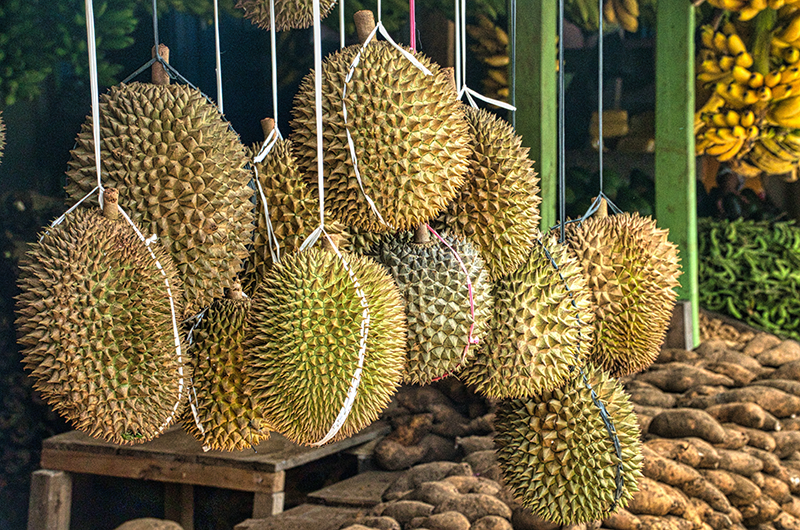Article Summary
Just mention the king of fruits, and many will surely picture thorny skin and golden yellow durian flesh. With each passing year, durian, better known as the king of fruits, gets an overwhelming response and becomes the talk of the town because the fruit has its own fan base.
By: Nurul Ezzaty Mohd Azhari

Just mention the king of fruits, and many will surely picture thorny skin and golden yellow durian flesh. With each passing year, durian, better known as the king of fruits, gets an overwhelming response and becomes the talk of the town because the fruit has its own fan base.
When the season arrives, durian fans flock to buy the fruit regardless of day or night. Even the sick one desperately wants a taste of durian. This clearly shows that durian has its own attraction, and its satisfaction is incomparable.
However, some people are averse to its smell and feel that the taste of the fruit depends on individuals. In Malaysia, durian is widely used in the food industry, namely in the production of ice cream, cakes, crisps, light snacks, bread with filling and even used in traditional and modern desserts, such as serawa durian (durian sticky rice), porridge and crepe.
The uniqueness of durian strengthens family ties and friendships because joy is felt when the fruit is shared. Sometimes we see the southern population travelling up north in convoy to taste the deliciousness of this king of fruits. The durian season witnesses families are gathering together.
In addition, durian offers nutrients and benefits to health because it contains nutritional components, namely Carotenoids and Flavonoids that act as antioxidants and Polyphenols that act as an anti-inflammatory.
Among the nutrients offered by durian is to aid digestion due to its fibre content which facilitates intestinal movements and digestion. Durian is rich in iron, and it helps to prevent anaemia. Iron is an important element for the formation of red blood cells.
Interestingly, every 100g of durian contributes about 23.3mg of Vitamin C. This shows that durian has a high composition of Vitamin C and can prevent scurvy (Vitamin C deficiency) and boost the body’s immune system.
There are two sides to every coin. As such, durian should not be consumed in excess as its high carbohydrate content may cause an increase in blood sugar levels, especially for diabetic patients. Anything may happen if sugar in the blood is not kept in check.
According to the Malaysian Department of Agriculture, more than 200 varieties of durian have been registered under it, and Malaysia is the largest producer of durians, surpassing Thailand and Indonesia. Recently, the Kedah State Department of Agriculture introduced new durian varieties known as D216 (J Sparrow) and D217 (Jerai) grown at a durian farm in Kampung Ketapang, Sungai Tok Pawang, Bedong.
The country's most popular durian that holds the throne as the king of fruits is none other than Musang King, with the code D197, which originates from Tanah Merah, Kelantan. It is a favourite import in China, the United States and Australia, and its high demand has made its price more expensive.
It is common knowledge that the price of durian is now increasing to a point where the local community can no longer afford it and become mere roadside spectators. We certainly would not want the price of durian to keep increasing as the marketing system has changed to weighing instead of buying durians in piles.
Director of the Putra Agriculture Centre, Universiti Putra Malaysia (UPM), Assoc. Prof. Dr. Siti Zaharah Sakimin, said the durian industry should be boosted by encouraging durian cultivation to prevent durian prices from rising further.
She said the potential price reduction would occur if the country’s durian industry was more vibrant and helped the community to purchase because the price is determined by the quantity of durian production in Malaysia.
She further explained that Musang King has a premium taste and price, sometimes reaching up to RM80 per kilogram. It needs to be cultivated more so it can be widely marketed, and Malaysians could have it at a more common price.
Logically, the price of a product would go down when it is produced in large quantities. However, if the product is limited in quantity, the public would not be able to afford it.
The Federal Agricultural Marketing Authority (FAMA) is also working with the ministry to expand access to the potential durian market with various promotions and awareness campaigns for overseas consumers. It clearly shows that the durian industry can become a new source of wealth with many exports to high potential markets in various foreign countries.
Based on FAMA records, the export value of durians in 2016 was RM69.9 million, while in 2020, it exceeded RM144.7 million. The Malaysian Department of Agriculture estimates that durian production in the country will increase to 493,397 tonnes by 2025 due to the use of high technology.
Therefore, we expect durian entrepreneurs to offer a variety of durians or cloned durians, such as durian botak, which will become a new product for durian enthusiasts in the country.
In addition, there is a need to increase the cultivation of durian trees, which is often in demand both locally and abroad, to improve the country’s economy further as well as allow farmers and entrepreneurs to have better opportunities in the future. - UPM
Date of Input: 01/07/2022 | Updated: 01/07/2022 | hairul_nizam
MEDIA SHARING



























